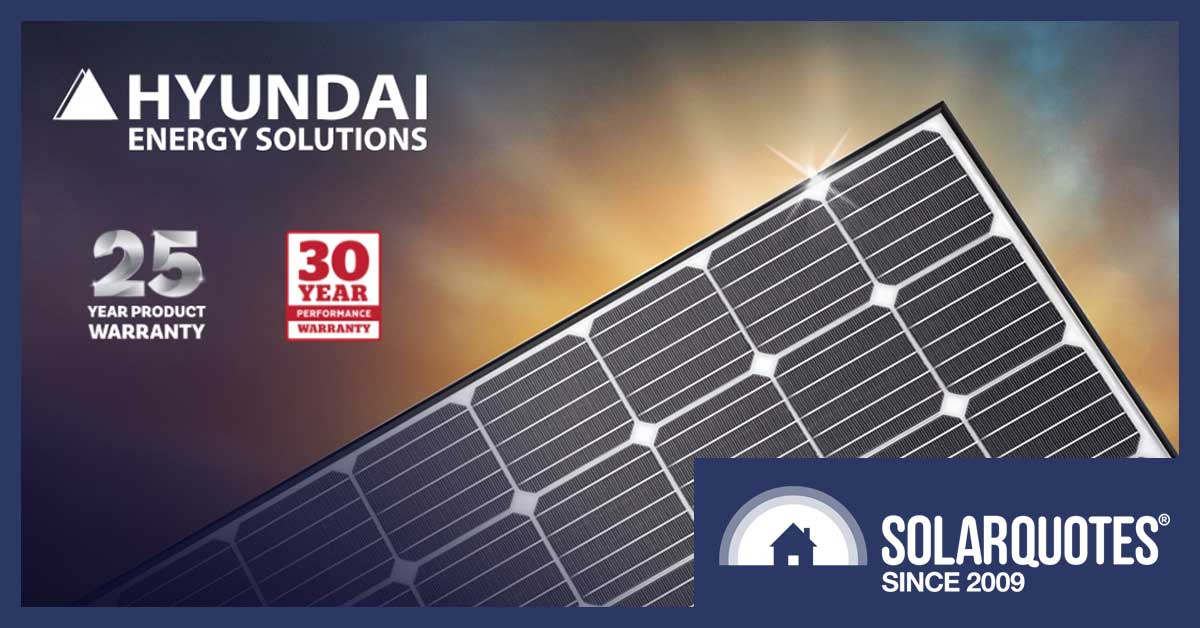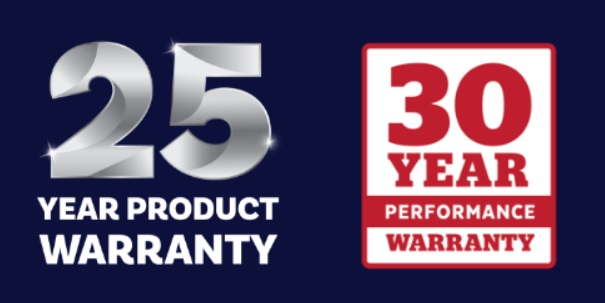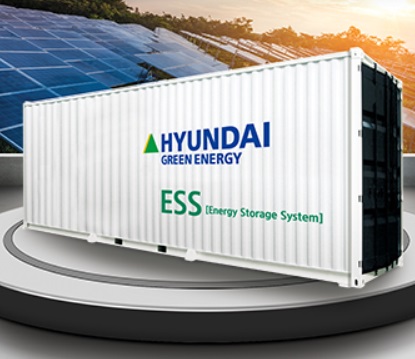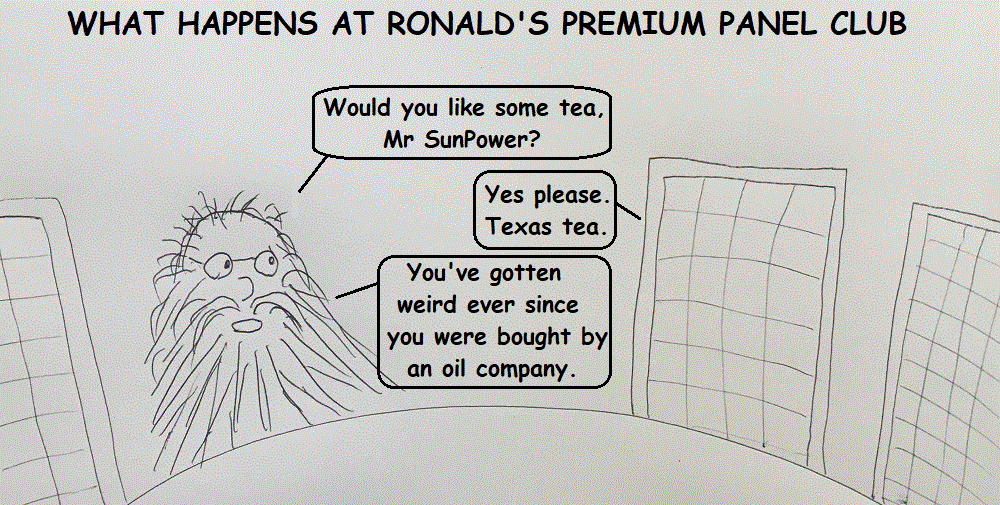
Hyundai have increased the product warranty of their solar panels from 12 to 25 years! O frabjous dai! Hyun! Hyai!
I have great news for anyone who wants a 25 year product warranty on their solar panels but doesn’t want to pay big bucks to get it. On the first of this month Hyundai Energy Solutions increased their product warranty in Australia from 12 to 25 years.1
The estimated retail price of these Hyundai panels is around 75 cents per watt. There are panels with only 10 or 12 years product warranty that cost about this much, so it goes to show these days a long warranty doesn’t require deep pockets.
Hyundai Joins The 25+ Year Product Warranty Club
Hyundai has joined an exclusive club that only has four other members I know of. Panel manufacturers offering product warranties of 25 years or longer in Australia are:
Without seeking anyone else’s input on this at all, I’m going to declare panels from reliable companies with product warranties of 25 years or more to be premium solar panels. Admittedly, this category doesn’t mean anything more than, “What Ronald considers to be a premium panel”, but I say it’s still a good category to be in.
As for REC solar panels and their 20 year product warranty, they’re a premium panel as far as most people are concerned, but to get into my premium panel club they have to go the extra distance and add another 5 years. I don’t want to rush REC into anything they’re not ready for, but I’ll them know I’m willing to send them a hand drawn certificate of welcome to Ronald’s Premium Panel Club when they manage it.
Update 11:54 — It’s been pointed out in the comments that REC will provide a 25 year product warranty if they are installed by an REC approved installer, so they are now in my club! Congratulations REC! Membership information won’t be arriving in the mail soon. Thanks to Andy and Chase for pointing that out.
25 Year Product Warranty + 30 Year Performance Warranty
Solar panels come with two warranties — product and performance. Product warranties range from a minimum of 10 years all the way to 30 years and cover defects in manufacturing. Performance warranties are all either 25 or 30 years, regardless of the quality of the solar panel, and generally cover bugger all once you read the small print. In many countries only the product warranty is useful to households as performance warranties are next to worthless.
I have argued — despite not being a lawyer — that under Australian consumer law a 25 year performance warranty is the same as a 25 year product warranty. But regardless of whether or not the law is on your side3, you will probably have a much easier time making a warranty claim on a solar panel if it is still covered by its product warranty.
Hyundai solar panels now have a 25 year product warranty, but they also have a 30 year performance warranty. This puts their total warranty coverage ahead of some other premium panels in my club.
2nd Place In Total Warranty Coverage
If we look at the combination of product and performance warranties then the winners, in order, are:
- Solarwatt: 30 year product and performance warranties.
- Hyundai: 25 year product warranty and 30 year performance warranty.
- LG Solar, SunPower, Tindo: 25 year product and performance warranty.
- Everyone else, all the way down to 10 year product warranties and 25 years performance warranties.
So in the race to the top for warranty coverage, Hyundai is in second place. That’s a hell of a leap considering one month ago their product warranty was just 12 years. It will be interesting to see if any other solar panel manufacturers make similar leaps. It will also be interesting to see what happens to prices, as those of Hyundai and Solarwatts are very competitive.
You can compare the features of premium panels and others in our solar panel comparison table. (Solarwatts isn’t on the table yet, but now Jono is back from his vacation we’ll get him to chase down its details.)

From 12 years product warranty to 25 years. That’s a small step for a man but one giant leap for panel kind. (Because they don’t have legs.)
Efficiency Not As Impressive As Warranty
If we check out the efficiencies of all five (now six) members of my Premium Panel Club, for solar panels available at the moment, they are:
- SunPower: up to 22.6%
- LG Solar: up to 21.4%
- REC: up to 21.4%4
- Hyundai: 18.4%
- Solarwatts: up to 18.3%
- Tindo: up to 18%
As you can see, the top two have a considerable efficiency advantage over the bottom two and you’ll have to pay a premium on those premium panels to get that extra efficiency. A rooftop solar power system using the most efficient SunPower panels will take up around 20% less space than a system of the same capacity using the most efficient Tindo panels. So high efficiency is very useful for making the most of limited roof space, but if roof space is not an issue then home owners don’t really need to be worried about it.
Will Hyundai Energy Solutions Be Around In 25 Years?
When I wrote about Hyundai Energy Solutions in April I called them Hyundai Green Energy. It’s the same thing, but it seems they want to be called Energy Solutions in Australia. Hyundai started selling solar panels here about 10 years ago but took a break from sales for around six years before recently reentering the market. Even when Hyundai weren’t selling in the country they continued to provide warranty support — as they should. But the question is, will this company still be around in the future to support their warranties that are 25 and 30 years long?

Green Energy/Energy Solutions, make up your mind…
I think they will be. Mind you, I could be an idiot. I also thought Kodak and the Mammoth Fat Spear Wax Company would last long term and only one of them is still around.5 While it’s impossible to say what will happen over the next quarter of a century or more, I strongly suspect our robot overlords will allow Hyundai Energy Solutions to remain in operation and continue to support their warranties. After all, those bioslave shock collars aren’t going to charge themselves.6
Warranties From Diversified Manufacturers Are Safer?
Supply Partners are the distributors for Hyundai panels and I talked to them on Friday. They told me solar panel warranties from diversified manufacturers are safer than those from companies that only make solar panels. Their explanation was if a diversified manufacturer fails to compete in the solar panel market it can move out of that area and concentrate on their other areas, but will still be around to support warranties. Bosch, BP, and Schott are example of companies that no longer manufacture solar panels but still support the ones they’ve sold. But if a company that only makes solar panels fails to be competitive, then the whole company will disappear and take their warranty support with them.
I can see there is some sense to this. Of course, a diversified company could have a problem in a non-solar area and go bust because of that. It’s possible the solar energy side of the business could continue on and support warranties or it might disappear. I’d say diversification is a factor to consider when assessing the likely longevity of a company, but it’s not as important as overall health or — in some countries — how likely the government is to keep it on life support if it runs into serious financial trouble.7
Quality Is More Important Than Warranty
If you want a problem free solar installation then you are much better off having the most reliable panels than the ones with the longest warranty. Having solar panels tough enough to operate without problem for over 25 years is better protection than any piece of paper or collection of ones and zeros. But highly reliable panels are likely to have long product warranties. If their failure rate is low their manufacturer may as well give them a long warranty, as it won’t cost them much and will help them beat the competition.
It also works the other way. Increasing the product warranty will cause a manufacturer to focus on improving the reliability of their panels. Hyundai now has an excellent incentive to ensure every solar panel they send to Australia is extremely reliable and to continue to tweak their panels to improve reliability to keep warranty support costs down.
Solar panel manufacturers are now in a race to the top when it comes to providing competitively priced panels with long product warranties. That top is currently 25-30 years, but even that may increase in the future. For a very long time I’ve been saying there is no point in buying cheap, no-name, solar panels to save a few hundred dollars. I might soon be saying the same thing about panels that don’t have 25 year or longer product warranties.
Footnotes
- Update 12:09 pm: This applies to panels sold from the 1st of August and only to their 300 watt 60 cell RG series and their 360 watt 72 cell RI series. If there is still older stock being sold that aren’t these panels the improved product warranty won’t apply. ↩
- When bought through official channels and Solar Analytics is installed. ↩
- If the law says it’s not on your side make sure you’re not actually talking to big business wearing a fake mustache. ↩
- Update: I didn’t originally include REC here but it has been pointed out to me they do offer a 25 year warranty if an installer they approve of is used. ↩
- If case you are curious, it’s Kodak that still exists. They got really good at safely transporting grandad’s wind up cameras and film and now sell millions of dollars worth of packaging every year. ↩
- It’s really difficult to convince a bioslave to pedal a generator enthusiastically when it’s being used to generate shocks to punish them for not pedaling hard enough. ↩
- Hyundai Energy Solutions does more than make solar panels, but they don’t appear to be what I would call very diversified. They are part of the massive and diversified Korean Hyundai group. While they may not be legally obligated to support each other, at the moment I think they are likely to if one member has difficulties. If all members have difficulties at the same time then there could be a problem. ↩


 RSS - Posts
RSS - Posts



Hi Ronald, REC modules include a 20plus 5 year manufacturers warranty when installed by an REC approved installer.
Thanks for mentioning that. I have updated the article so REC is now part of my Premium Panel Club.
Rec has 25 years if the installer is an REC Solar Professional.
A rooftop solar power system using the most efficient SunPower panels will take up around 20% less space than a system of the same capacity using the most efficient Tindo panels
How did tou calculate it? The difference in performance is only about 4%.
Sunpower is 4 absolute percentage points more efficient but 20% more efficient looking at it relatively.
Thanks for that. I have updated the article to include this.
This only applies to Hyundai’s 300W “RG” Series Panel
Thanks for bringing this up. I’ve added a footnote. Do you know if there older model Hyundai panels that are still being sold?
Hi Ronald,
I liked your discussion of the value of warranties and the credit risks a consumer faces with any long term warranty. Thank you for increasing both your and consumer awareness of this issue.
Yep. I had REC panels installed recently and the appeal of them was the 25 year warranty.
75c per Watt for Hyundai works out at a 50% premium per Watt vs say JA
OK you get 25 years guarantee vs 10 years. But given the rate of progress, would it be worth complaining re even10 year old panels today – so the extra 15 years of guarantee is not highly valuable
I’d far rather get the certainty of my payback in 6 years (2025) not 9 (2028), versus a notional quality guarantee for a fault on one of the panels in 2044 when I probably will have moved house anyway.
Because we need, as a human race to expect greater than a 10-year design life from an energy generation asset. An asset that when well constructed have demonstrated to last well in excess of 20 years. With an (average) embedded energy deficit of 2-3 years, the ‘bigger picture (sustainability) argument’ for installing solar PV becomes considerably weaker if these panels are being dumped to landfill after 10 years.
FYI The reputable 25-year warranties cover owner transferal. So your home buyer or maybe your kids will benefit from a more considered decision.
What I ~ and more people all the time would like is an independent, knowledgeble look at/report on FLEXIBLE solar panels. (including a critical look at warrantees offered)
Given the ever-widening role of solar power and the variations of applications, any unbiased infor would be most welcome. Speaking for myself the weight issue has become a matter of importance; where a flexible panel of a given output (apparently) weighs down to about 10% of a ‘standard’ rooftop unit.
Will look forward to some profound insights. (one would expect no less from you lot. 😉
I was told Hyundai have taken out insurance to cover the extended warranty (can’t verify the source though) . Regardless they would be incentivised now to reduce failure rate as that could reduce their premiums.
I suppose it might take a while before that would filter through to reliability. So if we were buying now would one of the other premium products that have had the longer warranty for longer be Jess risk?
That’s not a bad point. I guess that it’s reasonable to assume a company that has had a 25 year product warranty for a long time would have gotten their failure rate lower than one that has only just introduced a 25 year product warranty. But I’m sure Hyundai Energy Solutions would have gotten their failure rate down to a very low level before agreeing to a 25 year product warranty. You may feel more secure going with a manufacturer that got there a while back, but for a household I’d say it probably does not make a lot of difference.
I manged to find 1 company that installed Hyundai panels in my area (Melbourne) via a quick google search. Whats the best way to find out who else can install them? I know the installer reviews on this site lists the panels supported, but I can’t figure out a way to easily search for those that stock Hyundai. Any help would be appreciated.
Hi Jen
If you contact Supply Partners they should be able to tell you who they supply them to in your area.